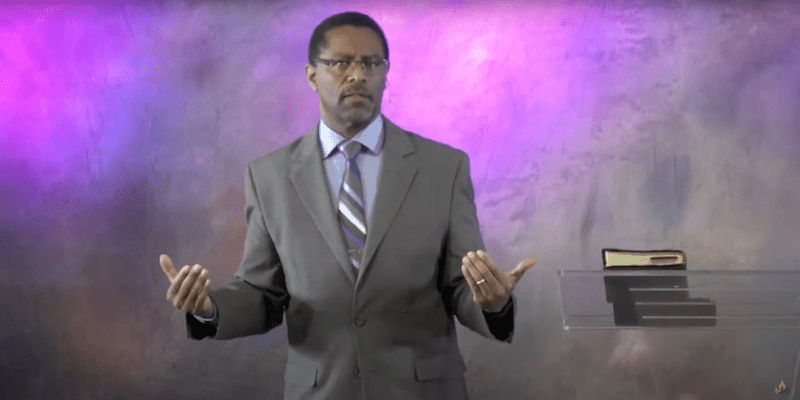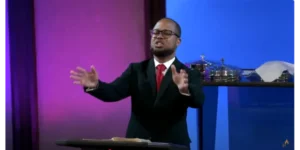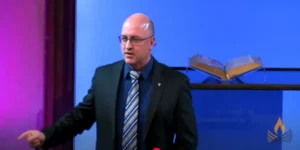Words matter. That is the main takeaway from this message as we go to the Word of God for perspective on the chaos at the capitol and in our world. Proverbs 18:21 says, “Death and life are in the power of the tongue, and those who love it will eat its fruit.”
Words matter because their fruit matters. “Watch out for false prophets. They come to you in sheep’s clothing, but inwardly they are ferocious wolves. By their fruit you will recognize them. Do people pick grapes from thornbushes, or figs from thistles? Likewise, every good tree bears good fruit, but a bad tree bears bad fruit.” Matt. 7:15-17 In these last days, when nobody knows truth from error and right from wrong, God’s people must be able to discern figs from thorns, good trees from bad trees and good fruit from strange fruit.
Carey Nieuwhof wrote in a blog that words create worlds. Rewind to Genesis 1:3 to see God speaking a world into existence. Even our words create realities that are hard to escape from. Look no farther than the wounds you may still carry from childhood inflicted by a parent, teacher, or friend.
What worlds did Lucifer create for the human family when he uttered the lie, “You will not surely die”? What world did Jim Jones create for the nearly 1,000 who followed him into mass suicide in Guyana? What words created a world in which five people lost their lives in an insurrection at the nation’s capital? And what world of confusion is created by the words of the lamb-like beast in Revelation 13 that speaks like a dragon? A world where “because of the signs he was given power to do on behalf of the first beast, he deceived the inhabitants of the earth.” Rev. 13:14.
Words matter. They create worlds and produce fruit. And in these last days it’s imperative that the words we take to heart and the words we speak are truthful and acceptable to God. (See Psalm 19:14.)
How do we avoid strange fruit and keep our words acceptable to God? Ask God to tame your tongue (James 3:6). Taming the tongue means speaking words consistent with your faith. Rewind to James 3:9-12 and Eph. 4:29. Praising God and cursing your fellow man is strange fruit.
To identify strange fruit, consider the source. Jesus said, “A good man brings good things out of the good stored up in his heart, and an evil man brings evil things out of the evil stored up in his heart. For the mouth speaks what the heart is full of.” Luke 6:45. The mouth speaks what the heart is full of.
How can you know if the source of someone’s speech is good or bad? Follow the fruit. (Compare the fruit of the Spirit in Gal. 5:22 with the “strange fruit,” or acts of the sinful nature in Gal. 5:19-21.) Follow the fruit and you’ll know if the source is good or rotten.
To produce good, not strange, fruit, pray the scriptures. See Psalm 19:7-11. What comes out of us in a crisis depends on what goes in. Pray the scriptures and good fruit will come out.
To produce good, not strange, fruit, abide in Christ’s words. See. John 15:7-8. Here is brought together the secret of the “greater things” promise in 14:12—“remaining” (dwelling, living), “in me” and “my words” and “asking.” Living in Christ by letting His words live in us makes the connection through which we can ask the Father anything and “much fruit” (“Greater things”) will be the result.
If we’re not living in Christ’s words, whose words are we living by? Our own. That’s a recipe for disaster because apart from Christ we can do nothing. To live by our own words, or those of another person or organization not speaking or living in the Word, is to bring forth “strange fruit” and show ultimately that we are not Christ’s disciples.
In the last days there will be more strange fruit around than we will know what to do with. Don’t swallow it. Ask God to tame your tongue. Consider the source. Follow the Fruit. Pray the Scriptures. Abide in the words of Christ and show yourselves to be disciples of His. –Pastor Randy
Rewind to Luke 2:21-25 for a study in contrasts between one who believes and one who does not. At first glance it may appear that Simeon is the priest on duty when the young family arrives to present Jesus in the redemption of the first-born ceremony. But Simeon is not a priest. Luke identifies him simply as “a man in Jerusalem who was righteous and devout.” He lived in prayerful expectancy of help for Israel. He was an “Adventist in waiting.”
Like Simeon, Adventists in waiting today (regardless of denominational label) have the privilege of looking for “that blessed hope, and the glorious appearing of the great God and our Savior Jesus Christ.” (Titus 2:13) All is well for Adventists in waiting because “Anyone who believes in him will never be put to shame.” Rom. 10:11
But where is the priest in the story? He is not mentioned. Why? Because in contrast to Simeon who recognized the Gift of God, the priest of God did not. To this worker in the house of God, Mary and Joseph were just another poor couple coming to do their temple duty. There was nothing in their appearance, or that of the baby, that attracted attention.
What made Jesus different? He looked like all the other children. Isa. 53:2 says, “He grew up before him like a tender shoot, and like a root out of dry ground. He had no beauty or majesty to attract us to him, nothing in his appearance that we should desire him.” What made Jesus different was in who His Father was. He was the anointed of God. Little did that priest think, that the babe in his arms, was the Majesty of heaven, the King of glory.
The priest was holding his own Heavenly High Priest to which every ritual and ceremony he performed pointed. But he didn’t see it. And there are people who hold the Bible in their hands and quote from it, yet don’t recognize the Jesus in it.
This, then is the main point of the message: You will never believe what you don’t want to believe, regardless of the evidence. Rewind to John 7:1-5, 16-18.
Despite seeing and knowing of Jesus’ miracles, his own brothers did not believe in Him. Clearly, you won’t believe what you don’t want to believe—even with all the evidence in the world. If you choose to believe a lie, no amount of truth will change your mind.
Belief does not consist purely of evidence, as Paul points out in Romans 1:19-20: “What may be known about God is plain to them, because God has made it plain to them. For since the creation of the world God’s invisible qualities—his eternal power and divine nature—have been clearly seen, being understood from what has been made, so that people are without excuse.”
So what is the key to belief? Look closely at John 7:16, 18. All is well for those who choose to do God’s will. Choosing to do God’s will over your own is the key to finding and knowing the truth. When you refuse to do the will of God, you will ultimately “exchange the truth of God for a lie.” See Rom 1:25. The Jewish leaders didn’t want to believe Jesus was the Messiah and they ended up vowing allegiance to Caesar and choosing Barabbas as their Messiah.
But God had witnesses that day at the temple. Though the priest left the Gift unwrapped, Simeon saw the glory in that bundle and received His heart’s desire. Rewind to Luke 2:26-32. What made the difference between what the priest saw and what Simeon saw? One was performing a ceremony; one was pursing the Christ. One held an office; the other was held and led by the Holy Spirit; One saw what so many today see—nothing special; nothing out of the ordinary; the other saw the salvation of all humankind
The Gift of God proves that “He will spare nothing, however dear, which is necessary to the completion of His work. No truth essential to our salvation is withheld, no miracle of mercy is neglected, no divine agency is left unemployed. Favor is heaped upon favor, gift upon gift. The whole treasury of heaven is open to those He seeks to save. Having collected the riches of the universe, and laid open the resources of infinite power, He gives them all into the hands of Christ, and says, All these are for man. Use these gifts to convince him that there is no love greater than Mine in earth or heaven. His greatest happiness will be found in loving Me. (Desire of Ages, p. 57)
You and I have received an unimaginable gift. Isn’t it time to unwrap it? As you do, you’ll discover the truth that Simeon and every Adventist since him to the present day knows: All is well for those who believe.
Pastor Randy Maxwell




